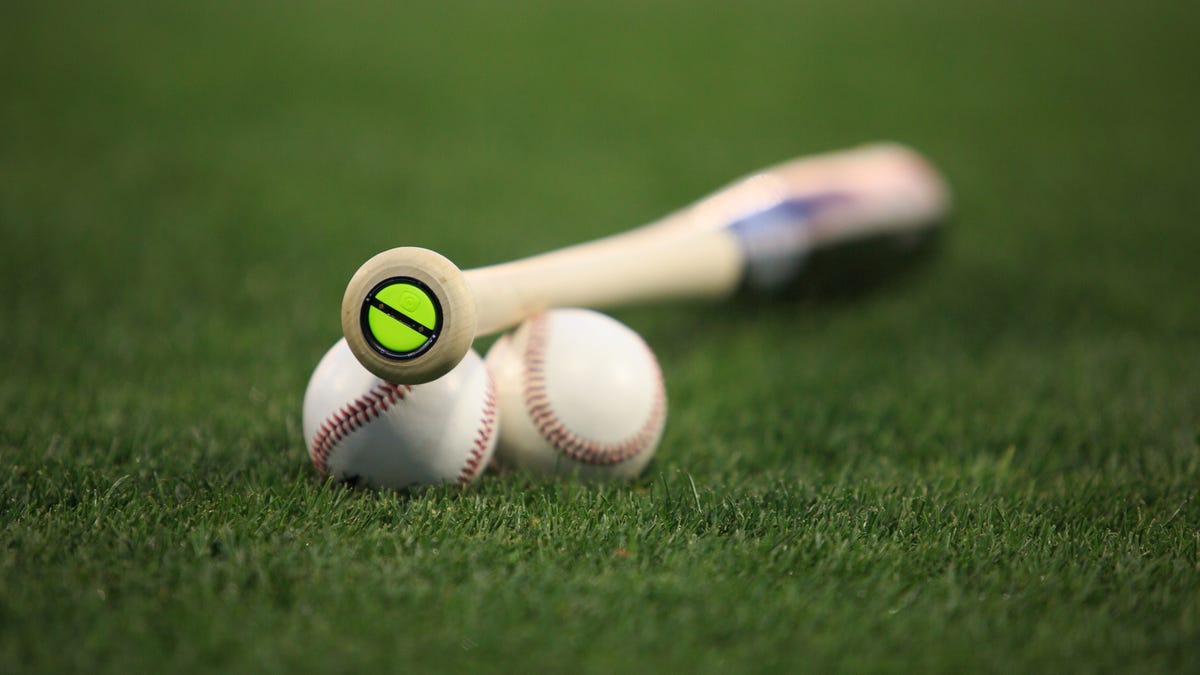Swinging away with the smart baseball bat
We take our hacks with a high-tech bat that promises to improve a hitter's swing.

I was game for this assignment.
For weeks I'd been hearing about a technologically advanced bat that's designed to help baseball and softball players improve their swings. The Smart Bat, which hits the market soon, has a sensor integrated into the handle that measures your hand speed on a swing and the resulting impact. The data is transmitted wirelessly to a smartphone.
On a warm Tuesday earlier this month, I asked CNET photographer James Martin to tag along as I went for a demo at Zepp Labs, the Silicon Valley sports-tech company that makes the Smart Bat. Soon I was hitting baseballs off a tee with a 33-inch, 30-ounce rock maple wooden bat -- shorter and slightly heavier than the one I'd normally use in my softball league -- hoping it wouldn't fly out of my hands.
It didn't take long for sweat to roll down my forehead.
WHACK...
WHACK...
WHACK...
CNET reporter Terry Collins takes his cuts using sport-tech company Zepp's Smart Bat, which will hit the market this summer. The bat has a sensor inside its handle to track speed and impact.
I play competitive softball at least twice a week, and I played American Legion baseball in high school, but I didn't know how my swing would stack up against a pro's. So the Zepp team measured it against their standards.
My swings were consistently between 60 and 70 miles per hour. I even hit 77 a couple of times.
Respectable, the Zepp team told me, adding that the data could help me get better.
"The data eliminates the guessing," said Pat Nicholson, a Zepp executive. "It can help you get better, faster."
The average bat speed of a Major League Baseball player is between 70 and 80 mph, but that varies. Mind you, I was hitting off a tee, and not against a big league pitcher, so that's why my swings were considered respectable. They weren't something I'd go around bragging about.
Pro tool
The Smart Bat isn't just for weekend warriors like me. Los Angeles Angels outfielder Mike Trout, an all-star who's arguably the best player in baseball, has partnered with Zepp to develop the bat. Trout, who didn't respond to a request for comment, used it during spring training.
Trout isn't alone in turning to technology to improve performance. Seattle Seahawks cornerback Richard Sherman endorses HeadTrainer, a mobile app designed to help athletes of all types improve their cognitive skills and spatial awareness by playing its in-app games. Los Angeles Clippers point guard Chris Paul co-created an app, Game Vision, that uses games it claims will increase court vision awareness.
Los Angeles Angels all-star Mike Trout helped design a smart bat with Zepp Labs that they hope can be used in an actual Major League Baseball game.
"I have learned how crucial technology has become in sports performance," Paul told me in a recent email. "It's really very exciting."
Zepp isn't new to smart-bat technology. The company began working with Trout in 2014, when the slugger was unanimously named the American League's Most Valuable Player. At the time, the sensor was attached to the bat's knob.
Data about how a batter is swinging streams to "Smart Coach," an app that offers video tips from big leaguers, including Trout and Chicago Cubs hitting coach John Mallee. A new version of the sensor, Zepp 2, which can also track golf and tennis swings, hit the market earlier this month for about $150.
Last year, Trout and Zepp designed the new Smart Bat sensor that's built into the bat itself. The placement inside the bat's handle provides more-precise measurements of a swing and is less of a distraction than the original sensor because batters don't see it. The company, which has approached Major League Baseball and the players association, hopes the bat might be used in actual games.
Trout, renowned for his fast, compact swing, can tell when his is off by "even a hundredth" of a second, says John Hauer, who helps run Zepp's product team and worked with Trout on the bat. "He's that mechanical."
Zepp's technology is also being used by the Arizona Diamondbacks, Miami Marlins and San Diego Padres.
"They've helped us understand the sports science and the blueprint of a successful swing," said Hauer. "We're able to translate that into the hardware and software."
The Smart Bat will be used by youth baseball organizations, including Perfect Game USA and Cal Ripken Baseball.
Full count, bottom of the ninth
At Zepp Labs, I continued swinging ferociously. Hauer eventually showed me a 3D rendering of my swing on my iPhone. The Zepp team encouraged me to keep my hands back and open my hips more to generate more power.
After another 30 swings, I hit 77 mph again. "Good impact, repeat that," said Lisa Beachy, a Zepp spokeswoman. "You have quick bat speed."
I wanted to leave it there, end things on a high -- a walk-off if you will. But James, the CNET photog, needed another photo.
"Really, dude?" I asked.
WHACK...
My final swing registered 73 mph.
Heads nodded in approval.

